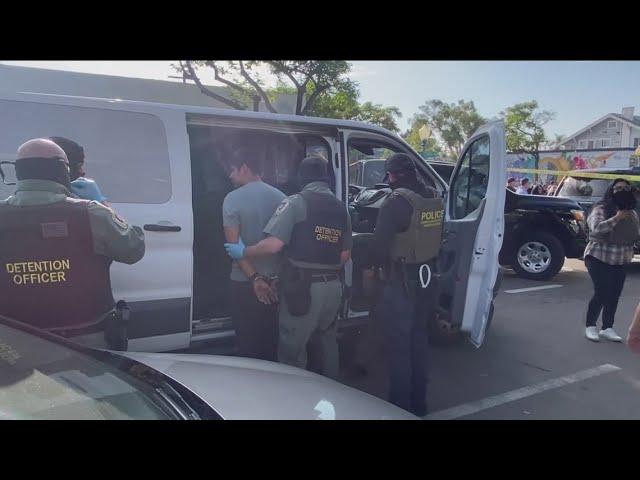San Diego elected officials have publicly condemned the immigration raid that took place last Friday in the South Park neighborhood, calling attention to the communityŌĆÖs concerns and the broader implications of such enforcement actions. The incident, which sparked immediate outrage among residents and local leaders, has reignited debates over immigration policies and their impact on vulnerable populations within the city. This article examines the responses from San DiegoŌĆÖs political representatives, the details of the raid, and the ongoing dialogue surrounding immigration enforcement in the region.
San Diego Leaders Condemn Immigration Raid in South Park
Local officials in San Diego swiftly voiced their opposition to the immigration enforcement actions carried out last Friday in the South Park neighborhood, describing the operation as disruptive and harmful to community trust. Multiple leaders emphasized that such raids not only instill fear among immigrant families but also strain relationships between residents and law enforcement agencies, potentially undermining public safety efforts.
Key concerns highlighted by elected representatives include:
- The impact on children and schools in affected neighborhoods
- The increase in social tension and anxiety among immigrant communities
- The necessity for policy reforms promoting humane and transparent immigration practices
Community Impact and Response to Recent Enforcement Actions
In the wake of FridayŌĆÖs immigration enforcement operation in South Park, community leaders and residents voiced fierce opposition, emphasizing the profound social and emotional effects on local families. Many described the raid as a disruptive force that instilled fear throughout the neighborhood, impacting not only those directly targeted but also the broader immigrant community who see themselves at risk. Elected officials have united in calling for stronger protections and a more compassionate approach to immigration enforcement, underscoring the importance of community trust in law enforcement agencies.
The response from community organizations has been equally robust, focusing on immediate support and long-term advocacy. Groups have mobilized resources to provide legal aid, counseling, and emergency assistance to those affected, ensuring that impacted individuals have access to vital services. Some key community actions include:
- Legal clinics offering free consultations to detained or at-risk individuals
- Community outreach events to inform residents of their rights
- Coalitions forming to lobby local government for policy reforms
| Community Group | Initiative | Impact |
|---|---|---|
| South Park Defenders | Emergency legal aid | 50+ families helped |
| Voices for Justice | Know-your-rights workshops | 300+ attendees |
| San Diego Faith Coalition | Policy advocacy campaign | Ongoing efforts |
Calls for Policy Reform and Greater Oversight in Immigration Enforcement
In the wake of FridayŌĆÖs highly criticized immigration operation, local leaders have intensified demands for legislative changes to immigration enforcement policies. Elected officials emphasized the urgent need for greater transparency and accountability in federal immigration actions impacting communities. They called for reforms that prioritize humanitarian considerations and community trust, arguing that current practices often undermine public safety by fostering fear and discouraging cooperation with law enforcement.
Among the proposals highlighted were stricter oversight mechanisms, including:
- Independent review boards to monitor immigration raids
- Mandatory reporting of enforcement activities to local governments
- Enhanced training for officers on cultural competency and rights awareness
- Community engagement initiatives to support immigrant families
| Proposed Reform | Objective |
|---|---|
| Independent Review Boards | Increase accountability |
| Mandatory Reporting | Enhance transparency |
| Officer Training | Build community trust |
| Community Initiatives | Support immigrant families |
Recommendations for Protecting Immigrant Rights in Local Jurisdictions
Local authorities should enact comprehensive policies that prioritize the protection of immigrant communities from aggressive enforcement actions. Sanctuary city ordinances can be expanded and reinforced to limit cooperation with federal immigration authorities unless required by law, ensuring residents feel safe in reporting crimes or accessing vital services. Additionally, establishing clear guidelines for law enforcement interactions can prevent racial profiling and unlawful detentions, fostering trust between immigrant communities and local government bodies.
Community engagement and transparency are critical components in safeguarding immigrant rights. Municipalities are encouraged to collaborate with immigrant advocacy groups to develop educational programs about legal rights and available resources. Funding for legal aid services should be increased, providing immigrants with access to counsel during immigration proceedings. The following table illustrates key focus areas and recommended actions for local jurisdictions:
| Focus Area | Recommended Action |
|---|---|
| Law Enforcement | Restrict ICE collaboration & implement training on cultural competency |
| Legal Support | Expand funding for community legal clinics |
| Community Outreach | Partner with nonprofits to hold rights workshops |
| Policy Transparency | Publish clear protocols regarding immigration enforcement |
In Summary
As the fallout from FridayŌĆÖs immigration raid in South Park continues to reverberate, elected officials in San Diego have unequivocally condemned the operation, calling for greater transparency and reforms to immigration enforcement practices. Their statements underscore ongoing tensions between federal authorities and local communities, highlighting the complex balance between law enforcement and protecting residentsŌĆÖ rights. The dialogue sparked by this incident is likely to influence policy discussions in the region moving forward, as stakeholders seek to address the challenges posed by immigration enforcement in diverse neighborhoods.





